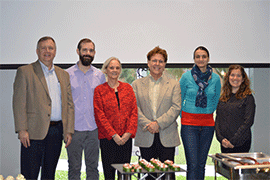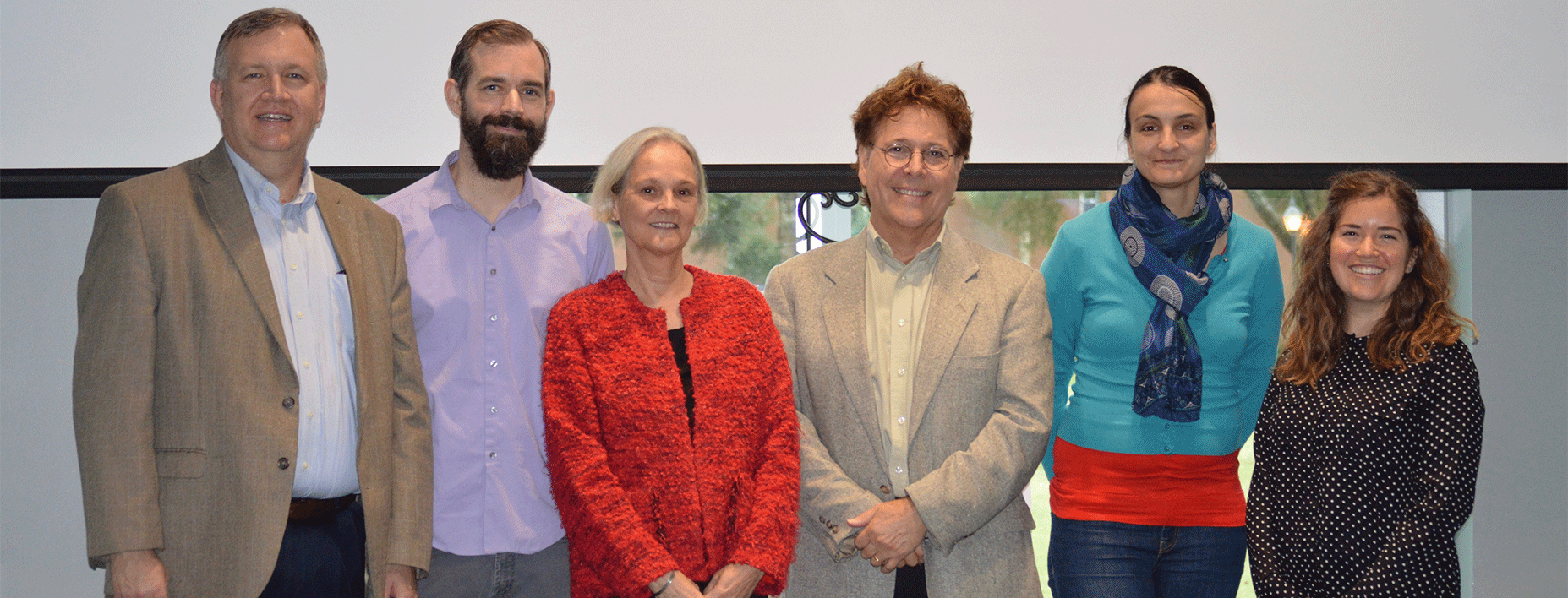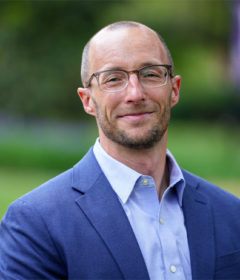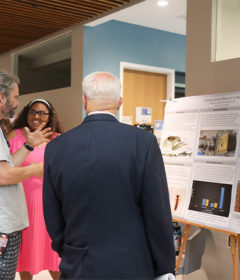‘Closing the Opportunity Gap’


Stetson’s Computer Science program would like to expand the diversity of its incoming class, attracting more women and students of color to the field.
To do so, the Department of Math and Computer Science will offer scholarships to its computer science camp for youth who are academically talented but under-represented in the computer science and STEM fields, said Joshua Eckroth, Ph.D., Stetson assistant professor of computer science.
The scholarships are part of a research project funded through the Nina B. Hollis Institute for Educational Reform, which celebrated Eckroth’s grant and four others at a reception in the Rinker Welcome Center on Monday, Dec. 10.
“The dominance of white males in computer science and STEM fields has been a trend for decades,” the Computer Science Camp proposal said. “This grant focuses on closing the opportunity gap that affects so many under-represented and privileged children.”
The Nina B. Hollis Research Impact Awards (NBHRIA) provide a maximum of $10,000 a year for up to three years to Stetson research projects that explore ways to improve P-12 educational outcomes for youth who are marginalized in society.
Other projects that received grants for 2018-19 include:
-

Stephen Robinson The Stetson Ethics Education Development (SEED) program in the School of Business Administration, which will address a crucial issue by introducing high school students to business ethics and moral decision-making, said John Tichenor, Ph.D., associate professor of management and one of the project researchers. The future leaders will examine the ethical implications of business and how leadership impacts society as a whole. The project will utilize undergraduate college students to deliver the program, furthering their understanding of this critical issue. Having ethical leaders will foster a more ethical treatment of those less fortunate.
- Instruments of Healing in the School of Music will provide fun-filled, stimulating musical activities to children, 6 to 10 years old, who are low-income and attend Starke or Woodward Elementary Schools. Stetson musicians will provide live music, performing and singing with the children, and teaching the basics of rhythm, melody and harmony with percussion instruments, keyboards, maracas, ukuleles and guitars, said Stephen Robinson, D.M., professor of music and faculty advisor to Instruments of Healing. This project will provide music educational opportunities for children who typically are unable to afford lessons. Research has shown that the long-term planning required to learn an instrument can improve study habits and skills.
-

Lauren Baucum, a guitar performance major, is founder and president of Instruments of Healing. The McInnis Garden-Based Learning Project from the College of Arts and Sciences intends to address the gap between the national enthusiasm for school gardens, and the lack of garden-based pedagogy in elementary teacher preparation programs, said Sarah Cramer, Ph.D., Brown visiting teacher-scholar fellow in sustainable food systems and one of the project’s investigators. McInnis Elementary in DeLeon Springs is a Title I school with a predominantly Hispanic student population and provides an ideal site to fulfill the Nina B. Hollis Institute’s mission of addressing systemic barriers to educational achievement in innovative ways.
- Florida “School to School” Pipeline project at Stetson College of Law in Gulfport seeks to help teenaged foster children avoid the so-called school to prison pipeline, using law student volunteers as Education Partners to get or keep the teens in school, ultimately

Law Professor Ann Piccard received a grant for the School to School” pipeline project. diverting them from further involvement with the legal system. The social and fiscal costs of mass incarceration are well-documented. Those costs will be reduced by interrupting the flow of the school to prison pipeline.
For more information about the Impact Awards, visit The Nina B. Hollis Institute for Educational Reform.



